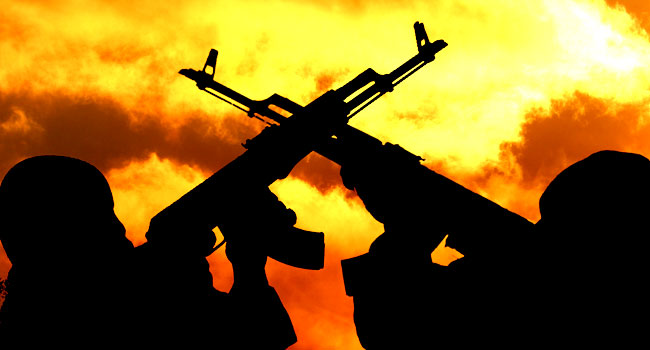Armed Group Kills Displaced Persons In DR Congo IDP Camp
The attack, suspected to have been executed by CODECO, has seen between 40 and 60 people dead in the DR Congo IDP camp in Ituri.

At least 50 persons including women and children were killed on Tuesday, Feb. 1, at a displaced persons camp in Ituri province of eastern DR Congo in an attack attributed to a communal armed group.
A source at the United Nations Multidimensional Integrated Stabilization Mission to the Democratic Republic of Congo (MONUSCO) disclosed the attack led to the death of 52 persons while about 30 others were injured.
On Wednesday morning, the Kivu Security Barometer (KSB), a group of researchers present within the conflict zone in the eastern DR Congo, gave 40 as the number of civilians killed with local weapons, while administrative sources and the local civil society spoke of “more than 50 dead.”
Lt. Jules Ngongo, army spokesperson in Ituri, had given an initial casualty figure of 21. “The massacre of civilians who have no means of defense is a crime against humanity,” the military spokesperson declared.
The Cooperative for the Development of Congo (CODECO) which claims to defend the interests of the Lendu community and attacks mainly members of the Hema community is suspected to be behind this new carnage.
“There was an incursion of CODECO militia around 9 p.m. to 10 p.m. in the displaced persons site commonly called Plaine Savo, about three kilometres from the locality of Bule in Djugu territory,” Jean Richard Dhedda Lenga, traditional ruler of Bahema Badjere chiefdom revealed.
“We have a provisional figure of 59 dead,” the chief said, adding that this figure could still rise. He said, “40 other persons were wounded and I have just left the scene as youths are searching for other corpses in the huts and bushes.”
“I have counted 53 corpses and others continue arriving. We have grouped them here at the site where I am,” said Desire Malo Dra, President of the civil society in the chiefdom.
“We have just taken 36 wounded persons to the Bule healthcentre and they include women and children. In fact, most of the victims are women and children.
“The militia came armed with machetes. Most of the victims had their throats cut,” continued the civil society leader, confirming that the assailants “operated calmly without any fear” and the army only arrived at the scene Wednesday morning.
“The UN Blue Berets went to the scene to stop the killings and push back the assailants,” MONUSCO said.
According to UNICEF, at least 15 children were among the dead and over 30 among the wounded.
The Norwegian Refugee Council, among other Non-governmental Organisations, strongly condemned these new killings and declared in a communique that “the Plaine Savo displaced persons camp housed more than 24,000 persons who fled from violence in Djugu territory in 2019.”
Djugu is one of the Ituri territories particularly affected by violence attributed to different factions of the CODECO who have been targeting mostly sites of displaced persons housing thousands of villagers chased from their homes by previous attacks.
In only eight days between the end of Nov. 2021 and the beginning of December, the KSB had recorded at least 123 civilians killed in the same region, mostly in IDP camps.
Ituri province, which borders Uganda is also affected by violence attributed to rebels of the Allied Democratic Forces (ADF), considered as the most murderous of the several armed groups which have been terrorising eastern DR Congo for over a quarter century. The ADF is also accused of being responsible for recent attacks by jihadists on Ugandan soil.
Ituri and neighbouring North Kivu province have since May 6, 2021 been under a state of siege, an exceptional measure which gives full powers to the army and the police but which has to date has not succeeded in putting an end to the exactions by armed groups in the eastern DR Congo.
In a communique published on Wednesday, national parliamentarians of Ituri origin described the massacre as “genocide” and the provincial coordination of civil societies has called for three days of national mourning.
Support Our Journalism
There are millions of ordinary people affected by conflict in Africa whose stories are missing in the mainstream media. HumAngle is determined to tell those challenging and under-reported stories, hoping that the people impacted by these conflicts will find the safety and security they deserve.
To ensure that we continue to provide public service coverage, we have a small favour to ask you. We want you to be part of our journalistic endeavour by contributing a token to us.
Your donation will further promote a robust, free, and independent media.
Donate HereStay Closer To The Stories That Matter




